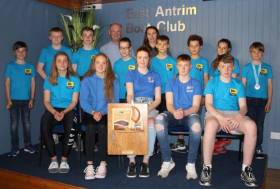Displaying items by tag: East Antrim
The GP14 'Hot Toddy' Event Returns to East Antrim Boat Club
As with so many events over the last 18 months, East Antrim Boat Club's annual Hot Toddy GP 14 event suffered the effects of the pandemic but next weekend (23rd/24th October) the class will take to the waters of Larne Lough on the Antrim coast for the end of season 'bash'.
Way back in 1982, East Antrim had been invited by the GP14 International Association to create a new end-of-season event for the class in Ireland. And so, the Hot Toddy was born and while today's event is somewhat different from the original it has remained a well-recognised gathering in the GP 14 calendar. Club historian Tom Jobling remembers; " Sponsored by Howden's, the then major coal importer in NI, presented a brand new silver cup to the Association for the event. As well, several competitors received complimentary bonus of bags of coal – remember; it was October!"
The first winner was Peter Duffy crewed by John Nixon from Ballyholme.
EABC enjoyed a well established and enthusiastic fleet of GP 14 sailors, expressed wholeheartedly by a particular rivalry between Co. Down and Co. Antrim clubs, which resulted in a fleet the envy of clubs north and south.
 Ger Owens of Royal St George YC who will be crewed by EABC's Melanie Morris
Ger Owens of Royal St George YC who will be crewed by EABC's Melanie Morris
Among the runners and riders for the silverware (no coal this time) are the obvious favourite, the current All Ireland sailing champion Ger Owens of Royal St George YC who will be crewed by EABC's Melanie Morris. Another contender will be the runner-up in that same event, Royal North's Ross Kearney from Belfast Lough, crewed by wife Jane. Then there's Greystones's Shane McCarthy and from Lough Foyle Yacht Club at Culmore the McGuiness brothers.
 Royal North's Ross Kearney from Belfast Lough racing in this month's All Ireland Sailing Championships in a National 18 dinghy Photo: Bob Bateman
Royal North's Ross Kearney from Belfast Lough racing in this month's All Ireland Sailing Championships in a National 18 dinghy Photo: Bob Bateman
Seventy years ago that well known Irish sailor, John McWilliam, introduced the GP14 to fellow EABC members and many of those have their names on the class trophies - Fekkes, Gingles, Morris, Nixon, Rowan and Thompson to name but a few.
Tom Jobling continues "The boat introduced to Larne Lough back the '50s was something of a revolution in plywood crafting but the current GP design whether in wood or fibre reinforced epoxy, is a revelation in modern marine architecture. It continues to ensure the GP14 is placed at the pinnacle of double-handed/multi sail competitive dinghy sailing across Ireland".
The appearance of the class off Curran Point next weekend should be an encouragement to those thinking of entering the club's Winter Series which starts on 31st October and runs to 27th March.
Entry to this event will cover or the Halloween Regatta, Christmas Regatta, early and late Winter Series, as well as boat storage for the period.
East Antrim Boat Club is Tops at NI Youth Sailing Champs
At the recent RYA-Northern Ireland Regional Youth Championship held in testing conditions at Strangford Lough Yacht Club, the team from East Antrim Boat Club emerged triumphantly.
Not only did their 13-strong-squad take the prestigious 'Top Club' trophy back to their Larne Lough base, but 420 helm Lucy Kane scored a perfect line of bullets to secure the class's Ulster title, and underpin her club's position.
Other notable EABC results included a 420 runner-up position for [crew]Abby Williamson while Zoe Whitford took 3rd overall in the Topper 5.3 with George Doig also 3rd overall in the Topper 4.2's. In total, the event attracted 155 competitors from all parts of Ireland.
A delighted EABC Commodore Steven Kirby said. "Fantastic effort by our Junior and Youth sailors - a great promise for the future."
East Antrim Boat Club
Located on the edge of Larne Lough in East Antrim Northern Ireland, we believe our club to be situated on some of the best sailing waters in the UK.
With members of all ages and ambitions, we have a healthy mix from cruising yachts through to competitive dinghies.
The focus of our sailing is on Tuesday and Thursday evenings and weekends throughout the season.
East Antrim Boat Club, Curran Point, Larne, Co. Antrim BT40 1AU, N. Ireland
Have we got your club details? Click here to get involved





























































